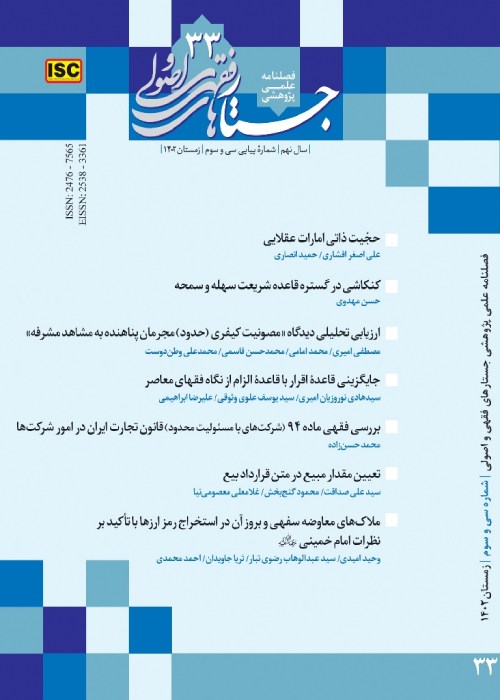A Jurisprudential reflection on Article "944" of the Iranian Civil Code (Wife inheritance from husband in diseases leading to death)
In Islamic and Iranian legal systems, divorce in cases where the husband is dying of an illness is distinct from other forms of divorce. Article "944" of the Iranian Civil Code stipulates that the wife could take inheritance from his dead husband within a year of her husband's death in cases where she has been divorced by her ill husband before his death, provided that she has not taken another husband and that her husband has died of the same disease. The references for this judgment are some seemingly contradictory and conflicting hadiths whose authenticity and the unification method needs to be investigated jurisprudentially. The article makes no difference between different kinds of divorce, and the wife is absolutely worthy of the inheritance. However, the Shiite jurists (Faqihs) have different judgments regarding the wife's inheritance in irrevocable divorce. Supporting the wife is said to be the wisdom behind the judgment mentioned above. Nonetheless, it raises this question whether such potentially deadly situations as snakebite, accident and those cases where the person is sentenced to blood-vengeance could be annexed to the judgment regarding the inheritance of wife in a divorce of the dying patient? Moreover, as the Islamic jurists differ in opinion concerning whether the judgment could exclusively be assigned to the wife or not, the issue needs to be carefully examined. Referring to the Shiite jurists' fatwas and comments regarding the judgment, the researchers of this study seek to resolve the ambiguities in the article, arguing that the death of the patient in less than a year of the same disease, and the fact that the illness led to the death are the primary requisites for the inheritance of the wife from her dead husband, provided that she has not remarried. This is an exceptional judgment specific to the divorce of the dying male patient and could be extended to the divorce of the dying female patient, i.e., The husband does not take inheritance from his ill wife. According to some hadiths, the inflication of harm stipulation has no particularity; therefore, the wife takes inheritance from her sick husband in all types of divorce, including the revocable and irrevocable divorce, the divorce by mutual agreement, and the divorce at the wife's instigation. Furthermore, the hadiths narrated in this regard are specific to the divorce of a dying male patient and do not include potentially deadly situations and conditions. Keywords: Patient, Wife, Inheritance, Revocable Divorce, Irrevocable Divorce, Dying Patient.
- حق عضویت دریافتی صرف حمایت از نشریات عضو و نگهداری، تکمیل و توسعه مگیران میشود.
- پرداخت حق اشتراک و دانلود مقالات اجازه بازنشر آن در سایر رسانههای چاپی و دیجیتال را به کاربر نمیدهد.


